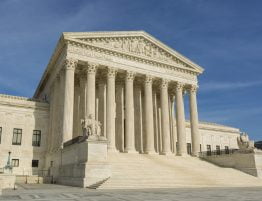
The recently-introduced Forced Arbitration Injustice Repeal (FAIR) Act has been published and, as we suspected, it’s very similar to the version passed by the House in the last Congress.
We reported in SAA 2021-06 (Feb. 18) that, as we had confidently predicted, the Democrats had reintroduced several bills to curb use of mandatory predispute arbitration agreements (“PDAA”). Among them was H.R. 963 – the Forced Arbitration Injustice Repeal (FAIR) Act, introduced February 11 by Rep. Henry “Hank” Johnson Jr. of Georgia. We noted that bill texts for the most part had not yet been published, and promised more expansive coverage after that had occurred. The FAIR Act was published recently, so we offer this analysis. The headline? If enacted it would ban mandatory arbitration for almost every conceivable transaction that’s not a business-to-business or union-management matter.
A Refresher
This bill would amend the Federal Arbitration Act (“FAA”) to eliminate mandatory PDAAs for disputes involving consumer, investor, employment (including independent contractors), and antitrust matters. It would cover brokers and investment advisers; bar class action/collective action waivers in or out of a PDAA; apply to “digital technology” disputes; reserve for court determination any arbitrability or delegation issues “irrespective of whether the agreement purported to delegate such determinations to an arbitrator;” and extend to a broad range of civil rights matters, including sexual harassment claims.
Specifics
We perused the bill’s text and offer below excerpts of interest to our readers:
No PDAAs in Several Areas: “The purposes of this Act are to … prohibit predispute arbitration agreements that force arbitration of future employment, consumer, antitrust, or civil rights disputes.”
No Class Action Waivers: “[P]rohibit agreements and practices that interfere with the right of individuals, workers, and small businesses to participate in a joint, class, or collective action related to an employment, consumer, antitrust, or civil rights dispute.”
Broad Definition of Civil Rights Disputes: “[T]he term ‘civil rights dispute’ means a dispute … (A) arising from an alleged violation of (i) the Constitution of the United States or the constitution of a State; ii) any Federal, State, or local law that prohibits discrimination on the basis of race, sex, age, gender identity, sexual orientation, disability, religion, national origin, or any legally protected status in education, employment, credit, housing, public accommodations and facilities, voting, veterans or servicemembers, health care, or a program funded or conducted by the Federal Government or State government, including any law referred to or described in section 62(e) of the Internal Revenue Code of 1986, including parts of such law not explicitly referenced in such section but that relate to protecting individuals on any such basis; and (B) in which at least one party alleging a violation described in subparagraph (A) is one or more individuals (or their authorized representative), including one or more individuals seeking certification as a class under rule 23 of the Federal Rules of Civil Procedure or a comparable rule or provision of State law.”
Broad Definition of Consumer Dispute: “[A] dispute between … (A) One or more individuals who seek or acquire real or personal property, services (including services related to digital technology), securities or other investments, money, or credit for personal, family, or household purposes including an individual or individuals who seek certification as a class under … the Federal Rules of Civil Procedure or a comparable rule or provision of State law; and (B)(i) the seller or provider of such property, services, securities or other investments, money, or credit; or (ii) a third party involved in the selling, providing of, payment for, receipt or use of information about, or other relationship to any such property, services, securities or other investments, money, or credit” (emphasis added).
Broad Definition of Employment Dispute: “[A] dispute between one or more individuals (or their authorized representative) and a person arising out of or related to the work relationship or prospective work relationship between them, including a dispute regarding the terms of or payment for, advertising of, recruiting for, referring of, arranging for, or discipline or discharge in connection with, such work, regardless of whether the individual is or would be classified as an employee or an independent contractor with respect to such work, and including a dispute arising under any law referred to or described in section 62(e) of the Internal Revenue Code of 1986 … that relate to protecting individuals on any such basis, and including a dispute in which an individual or individuals seek certification as a class under … the Federal Rules of Civil Procedure or as a collective action under section 16(b) of the Fair Labor Standards Act, or a comparable rule or provision of State law.” This is so: “regardless of whether such individuals are designated as employees or independent contractors for other purposes.”
Courts Decide Arbitrability or Delegation: “The applicability of this chapter to an agreement to arbitrate and the validity and enforceability of an agreement to which this chapter applies shall be determined by a court, rather than an arbitrator, irrespective of whether the party resisting arbitration challenges the arbitration agreement specifically or in conjunction with other terms of the contract containing such agreement, and irrespective of whether the agreement purports to delegate such determinations to an arbitrator.”
Labor Relations Carveout: “Nothing in this chapter shall apply to any arbitration provision in a contract between an employer and a labor organization or between labor organizations …” However, workers are permitted to seek: “judicial enforcement of a right arising under a provision of the Constitution of the United States, a State constitution, or a Federal or State statute, or public policy arising therefrom.”
Existing Disputes Carveout: “Nothing in this Act, or the amendments made by this Act, shall be construed to prohibit the use of arbitration on a voluntary basis after the dispute arises.”
Changes Would Apply to Existing PDAAs: “This Act, and the amendments made by this Act, shall take effect on the date of enactment of this Act and shall apply with respect to any dispute or claim that arises or accrues on or after such date.”
Prospects in the House
The prospects for House passage seem very good in our view. First, the prior iteration of the Act passed the House in the last Congress. Although the Democrats’ majority is slimmer, we think there are enough votes for House passage this time around. Also, as we reported in SAA 2021-09 (Mar. 11), the Protecting the Right to Organize (PRO) Act – H.R. 842 – passed in the House of Representatives on March 9 by a 225-206 mostly party-line vote that included five Republicans. This omnibus bill has a small provision (see pages 11-13 of the text) aimed at legislatively overruling Epic Systems Corp. v. Lewis, 138 S. Ct. 1612 (2018), where SCOTUS held that the FAA permits employers to use arbitration clauses containing class action waivers, notwithstanding the National Labor Relations Act’s (NLRA) protections of workers’ rights to act collectively. Specifically, the PRO Act would amend the NLRA to make it an unfair labor practice for any employer (not just those dealing with potential unionization) to use class action waivers, “notwithstanding” the Federal Arbitration Act. On the other hand, the current FAIR Act bill has only 165 co-sponsors, none of them Republicans, with 218 needed to pass.
Senate Prospects
While the Senate outcome is less certain, we think passage – with GOP support – is entirely possible, albeit with some changes. Why do we say this? Recall that we reported in SAA 2019-13 (Apr. 3) that the full Senate Judiciary Committee held an April 2019 hearing titled “Arbitration in America.” Based on the comments and questions from Committee members – including then-Chairman Lindsey Graham (R-SC) and former Chairman Charles Grassley (R-IA) – it seemed there was at least some Republican support for changes focused on arbitration fairness. For example, Chairman Graham said: “The problems we will hear about today bother me…. What’s good for business is not necessarily good for individuals…. It bothers me that when you sign up for a product or service you are giving away your rights. For the rest of this year this Committee will take a long and hard look at how arbitration can be improved. We will try to find some middle ground. We will find a way forward…. There have to be fairness standards.”
(ed: *We continue to think that retroactive nullification of existing PDAAs invites legal challenges based on the Fifth Amendment’s Takings Clause. **We will certainly keep our eye on this one!)

This post first appeared on the Securities Arbitration Alert blog. The blog’s editor-in-chief is George H. Friedman, Chairman of the Board of Directors for Arbitartion Resolution Services, Inc.





